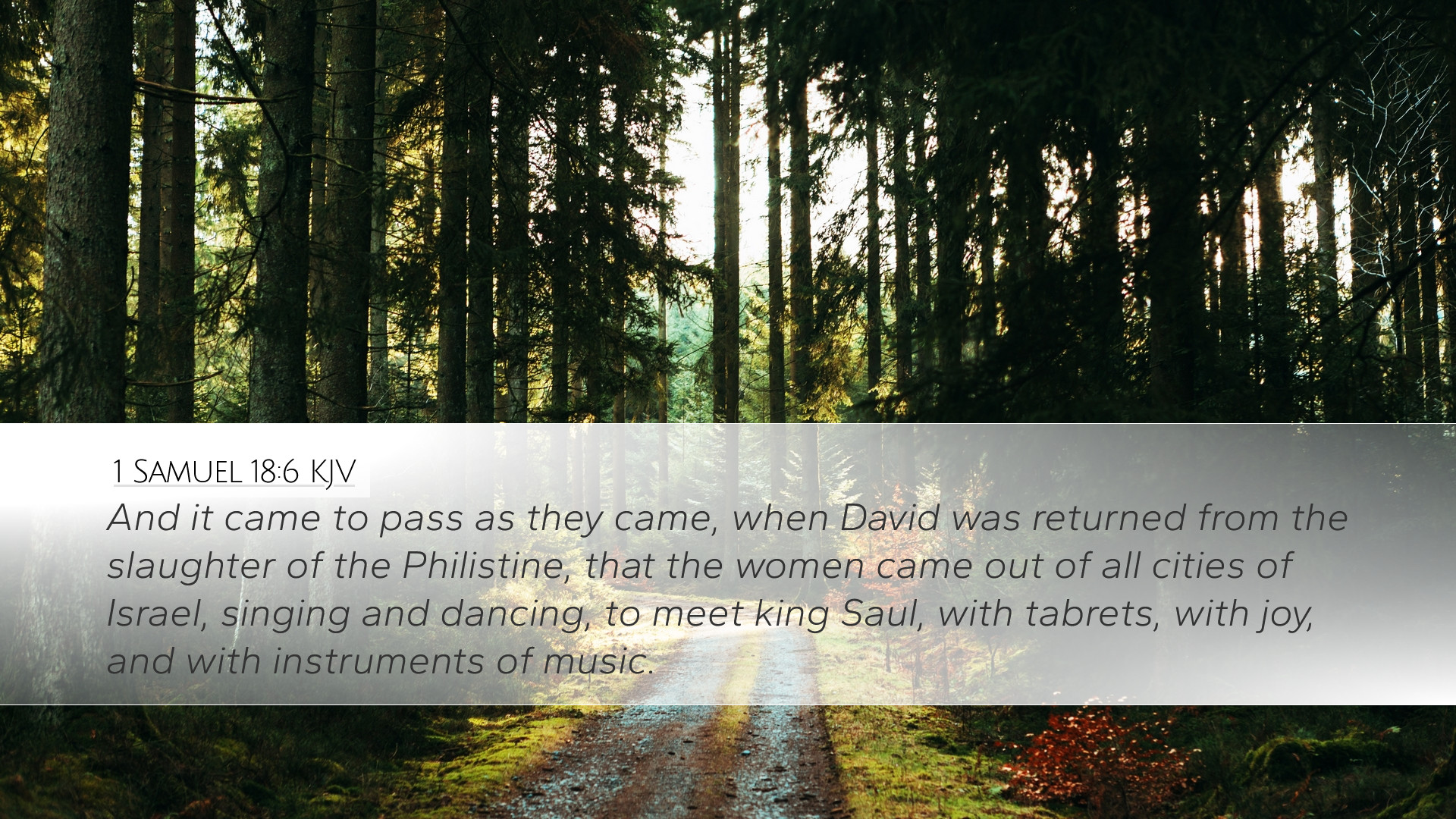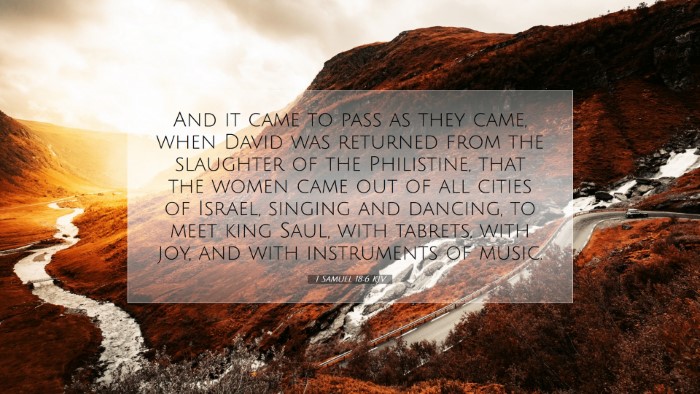Bible Commentary on 1 Samuel 18:6
Verse: "And it came to pass as they came, when David was returned from the slaughter of the Philistine, that the women came out of all cities of Israel, singing and dancing, to meet king Saul, with tabrets, with joy, and with instruments of musick." (1 Samuel 18:6, KJV)
Introduction
This verse marks a pivotal moment in the narrative of David and Saul, encapsulating the early stages of David's rise to prominence in Israel. The celebration of David's victory over Goliath not only highlights his military prowess but also sets the stage for the complex relationship that will develop between Saul and David. In this commentary, insights from Matthew Henry, Albert Barnes, and Adam Clarke are synthesized to explore the theological and practical implications of this passage.
Contextual Analysis
To understand 1 Samuel 18:6, it is crucial to consider the preceding events within the broader narrative. David has just defeated Goliath, demonstrating his faith in God and his capabilities as a leader. This victory shifts public perception and lays the groundwork for the subsequent tension between Saul and David.
Cultural Relevance of Celebrations
Henry emphasizes the cultural practice of celebrating military victories through public displays of joy, songs, and dance. The involvement of women in this celebration illustrates their role in the social and religious life of Israel during this period. They came out "with tabrets and joy," which indicates a vibrant expression of communal victory.
The Significance of Music
Music serves as a vital element in Israelite culture, often accompanying moments of triumph. Clarke notes that the instruments mentioned signify a joyful noise made unto the Lord, showcasing how music was intertwined with worship and thanksgiving. This reinforces the idea that David’s victory was not merely a personal achievement but a collective blessing for the nation.
Theological Implications
This verse invites reflection on several theological themes:
- Divine Providence: The victory over Goliath underscored God's sovereignty and providential care for Israel. David's anointing was rooted in divine selection, a critical element highlighted by Barnes, who notes that God's hand was evident in David's success.
- The Fragility of Human Approval: As Saul hears the praises directed toward David, the seeds of envy and insecurity are sown. It is a cautionary reminder of how earthly acclaim can lead to spiritual downfall, as Saul struggles with what Henry describes as a “jealousy that devours his peace.”
- National Identity and Leadership: The public celebration of David reflects a shifting national identity. Clarke points out that this moment foreshadows a transition in leadership, as the people begin to rally around David, which ultimately leads to his promotion as the future king of Israel.
Character Studies
This verse provides insights into the characters involved:
- David: His humility amidst rising fame is noteworthy. Despite the accolades, David remains focused on his role as servant to God and His people. His victory reflects not just personal prowess but faithfulness to God's covenant.
- Saul: Saul's reaction to the people's celebration reveals the inner turmoil that will characterize his reign. The joy of his people becomes a source of dread, revealing the human heart's tendency toward jealousy and pride.
Implications for Leadership
The dynamics presented in this verse carry important lessons for contemporary leaders, including:
- The Role of Recognition: Leaders must navigate the waters of public approval and popularity. As seen with Saul, equitable recognition encourages healthy leadership rather than fostering rivalry.
- Responding to Success: The ability to celebrate the success of others is vital. Leaders should foster an environment where collective achievements are recognized rather than allowed to breed division.
Conclusion
1 Samuel 18:6 serves as a profound reflection on the complexities of leadership, public perception, and God's providential workings in history. This moment in Israel’s history reveals not only the joy of deliverance but also the foreshadowing of conflict that will arise from human emotions, particularly jealousy and fear. As pastors, students, theologians, and scholars examine this passage, they are invited to consider both the joyous aspects of communal worship and the potential pitfalls of leadership in times of transition.


